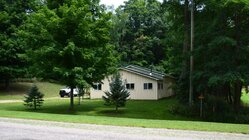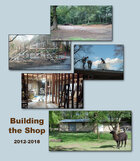General question as I'm a newbie on the site.
Wondering if all you on here just work out of your own space (basement/garage/outbuilding on your property) or if you turn in more of a community shop as you don't have your own home work space?
Why I'm asking:
Long story short - my Brother in law Jon has been a turner off and on for years. He has a few disabilities but has a true love for the art.
Jon had a shop in his Mom's garage as he lived with her but my wife and I recently had to closeup that shop as Jon lost his Mom last year and we sold the house.
Now we're in the process of paring down the wood and a good bit of gear.
He is now living with my wife and I and we're looking down the road to see if it's worth trying to put together a small shop for him (which will take some time - possibly year or two )
or if we should try to find some kind of community shop. I know years ago (15?) he was a member of the Pittsburgh, PA chapter of AAW. I believe it's called Turners Anonymous.
Just trying to decide if it's worth storing any equipment (which could be a few years of it sitting idle) or if it should just be sold for now and try to find a community shop to give him an opportunity to re-engage his craft and passion.
Then later just acquire different equipment if we can indeed get him some workspace.
I figured posting on here may help kick around some ideas my wife and I haven't thought of to sort out the best path forward to get my brother-in-law back on a lathe.
thanks,
Mark and Jon in Pgh

Wondering if all you on here just work out of your own space (basement/garage/outbuilding on your property) or if you turn in more of a community shop as you don't have your own home work space?
Why I'm asking:
Long story short - my Brother in law Jon has been a turner off and on for years. He has a few disabilities but has a true love for the art.
Jon had a shop in his Mom's garage as he lived with her but my wife and I recently had to closeup that shop as Jon lost his Mom last year and we sold the house.
Now we're in the process of paring down the wood and a good bit of gear.
He is now living with my wife and I and we're looking down the road to see if it's worth trying to put together a small shop for him (which will take some time - possibly year or two )
or if we should try to find some kind of community shop. I know years ago (15?) he was a member of the Pittsburgh, PA chapter of AAW. I believe it's called Turners Anonymous.
Just trying to decide if it's worth storing any equipment (which could be a few years of it sitting idle) or if it should just be sold for now and try to find a community shop to give him an opportunity to re-engage his craft and passion.
Then later just acquire different equipment if we can indeed get him some workspace.
I figured posting on here may help kick around some ideas my wife and I haven't thought of to sort out the best path forward to get my brother-in-law back on a lathe.
thanks,
Mark and Jon in Pgh



